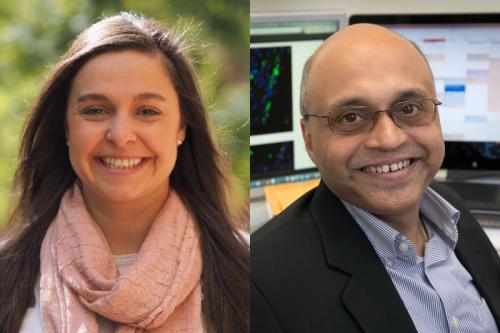
UCLA scientists receive more than $10 million in CIRM grants to advance therapies for stroke and heart failure
Researchers at the Eli and Edythe Broad Center of Regenerative Medicine and Stem Cell Research at UCLA have received more than $10 million in grants from the California Institute for Regenerative Medicine, the state’s stem cell agency, to help them propel two potential therapies to clinical trials.
The Translational Research Projects awards, given to UCLA scientists Irene Llorente and Dr. Arjun Deb, were announced at a CIRM meeting today.
Regenerative cell therapy for white matter stroke and vascular dementia
Llorente’s $5.9 million award will support translational studies of a stem cell therapy she is developing to promote tissue repair in white matter stroke, a progressive disease that leads to vascular dementia.
White matter stroke makes up 30% of all strokes — the leading cause of adult disability — and is the second leading cause of dementia. It is common in the U.S. to refer to all dementia as “mixed dementia,” as white matter stroke and Alzheimer’s disease are always seen together, each of these conditions accelerating the other.
Along with co-investigators Dr. S. Thomas Carmichael and William Lowry, Llorente developed a human stem cell-derived glial enriched progenitor cell therapy that is intended to treat white matter stroke and vascular dementia by stimulating brain repair.
In preclinical studies in mice, researchers found that transplanting human induced pluripotent stem cell-derived glial enriched progenitor cells into the brain after white matter stroke promoted new neural connections, enhancing motor and cognitive recovery.
“There’s currently no available treatment that promotes recovery or even slows disease progression in white matter stroke, so if this therapy could be successfully applied to humans, it would fulfill a major unmet medical need,” said Llorente, an assistant research professor of neurology at the David Geffen School of Medicine at UCLA.
Llorente’s cell therapy candidate works by turning the brain’s own repair mechanisms on. Since the cells are not directly repairing the brain, only triggering the body’s natural repair processes, efficacy of the therapy is not reliant on the survival or persistence of the transplanted cells.
“This novel therapy could help reduce the thing most of us fear, and that is losing our mind, losing our ability to think clearly, to engage in reading and writing, to lose memory of ourselves and our loved ones,” said Carmichael, professor and chair of neurology at the medical school.
Preventing the development of heart failure by altering the wound healing process
Deb’s $4.8 million award will fund translational studies of a novel therapeutic strategy that is intended to treat or prevent heart failure by altering the wound healing process.
According to the American Heart Association, more than 8 million people in the U.S. are projected to be diagnosed with heart failure by 2030. Despite currently available treatments, about 50% of patients do not survive more than five years after a diagnosis.
“The heart has limited ability to repair itself following injury such as a heart attack and there are no currently available therapies that can address this limitation,” said Deb, a professor of cardiology and director of the cardiovascular medicine research theme at the medical school.
Deb’s previous research established that in the aftermath of a heart attack, levels of a protein called ENPP1 increase, setting off a cascade of events that ultimately causes inflammation, cell death and reduced capacity for healing. Building on this study, he and his collaborators developed a monoclonal antibody — a type of laboratory-made protein that acts like an antibody found in the immune system — capable of inhibiting ENPP1. Monoclonal antibody therapies are used to treat or prevent an increasingly broad range of diseases, including various cancers, Crohn’s disease, asthma and rheumatoid arthritis.
In studies in mice, the researchers found that administering this monoclonal antibody after heart attack led to a significant decrease in inflammation and cell death, allowing for better heart repair.
Based on these promising results, the scientists created a monoclonal antibody targeting ENPP1 that is designed for human use. The CIRM grant will help the group further develop this humanized monoclonal antibody and take the steps necessary to bring it to clinical trial with the goal of preventing the development of heart failure after heart attack.
“If this therapeutic candidate can successfully be translated to clinical practice, it stands to have a major impact,” Deb said. “More than 700,000 patients have a heart attack every year in the U.S. alone and this population of patients is in dire need of an effective treatment.”
